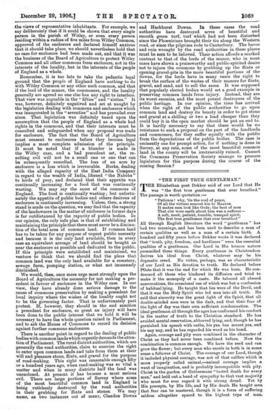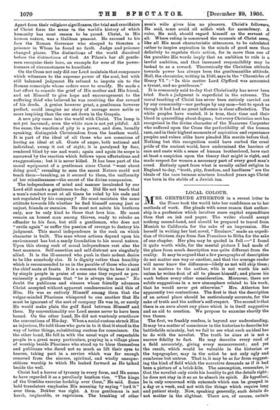"THE FIRST TRUE GENTLEMAN."
THE Elizabethan poet Dekker said of our Lord that He was "the first true gentleman that ever breathed." The passage is worth quotation :— " Patience ! why, 'tis the soul of peace,
Of all the virtues nearest kin to Heaven.
It makes men look like Gods; the best of mon
That e'er wore earth about him was a sufferer—
A soft, meek, patient, humble, tranquil spirit, The first true gentleman that ever breathed."
All through English literature the word " gentleman " has had two meanings, and has been used to describe a man of
certain qualities as well as a man of a certain birth. A hundred and fifty years before Dekker wrote it was declared
that "truth, pity, freedom, and hardiness" were the essential qualities of a gentleman. Our Lord in His human nature personified these things: Every gentleman in Christendom derives his ideal from Christ, whatever may be his dogmatic creed. No virtue, perhaps, was so characteristic of our Lord as His devotion to truth. He declared before Pilate that it was the end for which He was born. Ho con- demned all those who hindered its diffusion and tried to make it the monopoly of a caste. He tabooed all absurd asseverations, the occasional use of which was but a confession of habitual lying. He taught that lies were of the Devil, and that it was the Holy Spirit who led men into all truth. He said that sincerity was the great light of the Spirit, that all
double-minded men were in the dark, and that their fear of the light of day was their own sufficient condemnation. The ideal gentleman all through the ages has conformed his conduct in the matter of truth to the Christian standard. He has avoided mental reservation, abhorred lying, and, though he has garnished his speech with oaths, his yea has meant yea, and
his nay nay, and he has regarded his word as his bond.
Again, courage and pity were combined in the character of Christ as they had never been combined before. Now the combination is common enough. We have the seed and can grow the flower; but every man who excels in both is in some sense a follower of Christ. The courage of our Lord, though it included physical courage, was not of that calibre which is more properly called animal,—animal courage implies a
want of imagination, and is probably incompatible with pity. Christ in the garden of Gethsemane "tasted death for every man," and held out a hand of sympathy to that vast majority who must for ever regard it with strong dread. Yet by His precepts, by His life, and by His death He taught men that fear can be mastered, though it is a form of suffering seldom altogether spared to the highest type of man.
Apart Awl their religipus significance, the trial and crncifixion of Christ form the scene in the wor1d4 history of which humanity has most re,aaon to be proud. Christ, in His human nature, was a Galilean peasant. He excused to his face the Roman Governor who stooped to threaten a prisoner in Whom he found no fault. Judge and prisoner changed places. The distinctions of the world dissolved before the distinctions of God. At Pilate's bar all gentle- men recognise their hero, an example for ever of the power- lessness of circumstances to humiliate.
On the Cross not only did our Lord maintain that composure which witnesses to the supreme power of the soul, but with still balanced judgment He refused to impute sin to the Roman conscripts whose orders were to crucify. He made a last effort to console the grief of His mother and His friend, and set Himself to give hope and encouragement to the suffering thief who believed he was receiving the due reward of his deeds. A genius however great, a gentleman however perfect, could imagine no story of courage more noble or more inspiring than the one set down in the Gospels.
A new pity came into the world with Christ. The lump is not yet leavened; even the white race is not yet pitiful. All the same, the emotion of pity is a power, and does, broadly speaking, distinguish Christendom from the heathen world. It is part of the ideal of all those who are conscious of having an ideal at all. Gusts of anger, both national and individual, sweep it out of sight; it is paralysed by fear, rendered blind by use and wont; again and again its scope is narrowed by the reaction which follows upon affectations and exaggerations; but it is never killed. . It has been part of the moral equipment of a gentleman since Christ "went about doing good," revealing to men the secret Nature could not teach them—breaking, as it seemed to them, the uniformity of her relentlessness—the secret of the divine compassion.
The independence of mind and manner inculcated by our Lord still marks a gentleman to-day. Did He not teach that a man's conduct must at all times be ruled by his code and not regulated by his company He must maintain the same attitude towards life whether he find himself among just or unjust, friends or enemies. He must not salute his brethren only, nor be only kind to those that love him. He must remain an honest man among thieves, ready, to rebuke an offender to his face, but still a gentleman, who does not "revile again" or suffer the passion of revenge to destroy his judgment. This moral independence is the rock on which character is built. The man whose actions depend upon his environment has but a sandy foundation to his moral nature.
• Upon this strong rock of moral independence rest also the best manners. Self-assertion and self-distrust are singularly allied. It is the ill-assured who push in their ardent .desire to be like somebody else. It is dignity rather, than humility which is recommended to us in the parable of those who chose the chief seats at feasts. It is a common thing to hear it said by simple people in praise of some one they regard as pre- eminently a gentleman that "he is always the same." No doubt the publicans and sinners whose friendly advances Christ accepted without apparent condescension said this of Him. He was so entirely Himself among them that the vulgar-minded Pharisees whispered to one another that He must be ignorant of the sort of company He wee in, or surely He would make plain the gulf fixed between Himself and them. Ey conventionality our Lord seems never to have been bound. On the other hand, He did not wantonly overthrow the conventions of His day. When a social custom struck Him as injurious, He told those who gave in to it that it stood in the way of better things, substituting cuatom for eonscience.
, the other hand, He fell in with the, usual ways Of respectable people in a great many particular, praying in a village place of worship beside Pharisees who stood up to Mem themselves and publicans who dared not Se muell as lift their eyes to heaven, taking part in a service which, was far enough removed from the sincere, spiritual, and wholly unsuper- stitions worship to Which He looked forward as He talked beside the well.
Christ had a horror of tyranny in every form, and He seems to have regarded it as a peculiarly heathen vice. The kings , of the Gentiles exercise lordship over them," He said. Some :bold translators emphasise His, meaning by saying "lord it" over them. Dekker was right. A true gentleman is not harsh, implacable, or capricious. The breaking of other men's wills gives him no pleasure. Christ's followers, He said, must avoid . all selfish wish for ascendency. A ruler, He said, should regard himself as the servant of Where.raling is concerned the counsels of , Christ seem, like all His most characteristic utterances, to be calculated rather to inspire aspiration in the minds of good men than definitely to regulate their action, for in more than one of the parables His words imply that an ambition to rule . is a lawful ambition, and that increased responsibility may be looked to as a reward. Theoretically the Christian attitude towards power has always been the gentlemanlike attitude. Hall, the chronicler, writing in 1548, says in the "Chronicles of Henry VI." "In this matter Lord Clyfford was accounted a tyrant,- and no gentleman."
It is commonly said to-day that Christianity has never been tried. Such a judgment is superficial in the extreme. The moral teaching of Christ has never been entirely carried out by any community—nor perhaps by any man—but to speak as though it had had no great influence is sheer affectation. The white peoples have wasted, it is true, their time and their blood in quarrelling about dogma; but every Christian sect has recognised in the divine character of the Nazarene Carpenter who suffered upon the Cross the perfectibility of the human race, and in their highest moments of aspiration and repentance peoples and rulers .alike have pleaded His merits before God. Nothing but this recognition could have curbed the cruel pride of the ancient world, have undermined the barriers of race and caste with a sense of human brotherhood, have cast at least a suspicion upon the theory that might is right, and made respect for women a necessary part of every good man's creed. Entirely apart from :what is usually called religion in England to-day, "truth, pity, freedom, and hardiness" are the ideals of the race because nineteen hundred years ago Christ was born in the stable of a Jewish inn.



































 Previous page
Previous page